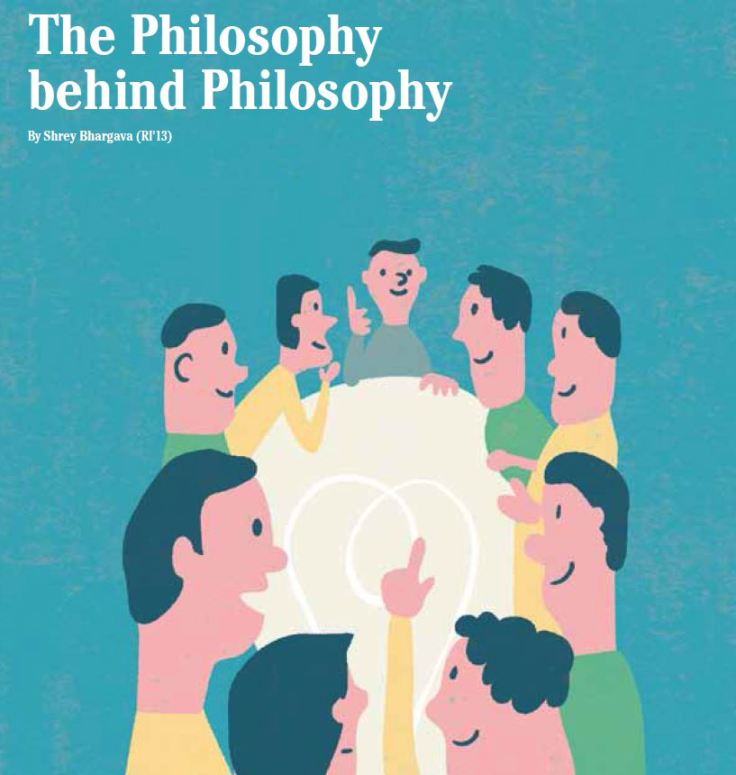
When I was in Raffles and I had to study Philosophy, my peers and I asked the familiar question – ‘But what can I do with it?’. I did not know then, but I was simply intrigued by Philosophy class’s reflections on life and society, so I enjoyed it at best and tolerated it at worst.
Today, I am an Actor and Filmmaker studying at the University of Southern California. Did Philosophy tangibly get me here? Maybe not. But did it absolutely inspire the very way of thinking that then propelled me into thinking deeply about the arts? Hell yes.
Being an Actor simply means that I am an observer of life. I live and breathe the process of creating authentic life experiences itself and to that end, I believe it is not only my duty, but my mission, to understand life completely and fully.
As I sit down at my desk to prepare for my next role, I find that there are always the same questions that I must answer:
‘What does my character want? And why?’
‘Why does he choose that particular way of trying to achieve what he wants?’
‘Why or why not does he believe what he has done is right or the ethical thing to do?’
‘What are his moral values? What is he guided and driven by?’
‘Does he have an idea of how he should have acted or should act in the future? Does he therefore feel guilt? Remorse? Or does he not? Why or why not?’
In essence, all these questions boil down to one central one – ‘What’s his philosophy of life?’
My work as an Actor is primarily to be the translator of life from page to stage. I must communicate to an audience all the psychological complexities that make us human. To do this, I must understand what drives humanity – the pains that we face, the reasons we face them, the contradictory philosophies we hold and how they manifest into conflicts between one another. I must bring life to these observations and for that I need one key ingredient – empathy. I must, above all else, know how to feel what others do and be able to communicate that authentically.
Our feelings in life are driven by our perceptions of events and our interpretations of them. Our interpretations are made based on our beliefs, biases and values. Our beliefs, biases and values are determined by how we experience the Truth of life. Through our 5 senses, we experience a Truth and we give meaning to what we experience. In other words, how we see the Truth of life to be is what defines our entire life experience. Our understanding of this Truth, then, is determined by our understanding and application of philosophy.
Diving into Wisdom
When I say ‘philosophy’, I mean the process of deduction that leads us ever closer to Truth. It is the way in which we distill the information we receive from our 5 senses and objectively analyze them to come to a conclusion about the reality that we live in and what the best way to govern ourselves during this lifetime is.
This is essential to all of human life. Whatever we experience, therefore, is a direct result of how well we build ourselves to understand the fabric of philosophy that defines our humanity. Philosophy, as I see it, is the foundation of what makes us critically thinking and feeling beings. It is what differentiates us from simply being an animal. It
is what makes us human itself.
The word, ‘Philosophy’, comes from the Greek ‘Philosophia’, which means the ‘love for wisdom’. Wisdom or knowledge about life – self-awareness – is exactly what makes us human. We are conscious of our reality; we are able to tell the difference between past, present and future; we are able to evaluate our own actions and come to more informed decisions about what to do in the future. Our consciousness is expanded the more we dive into wisdom or, by extension, into philosophy.
Even if one is not interested in Philosophy as an academic subject, one cannot deny the sheer significance it has in defining the mechanics of our existence. The study of philosophy can therefore, only make us live our lives better – nothing else.
From my experience, not only as an actor but simply as a person, the approach to looking inward, evaluating existing beliefs, judgements, prejudices, fallacies in thinking and more in order to find an approach to identifying answers to the aforementioned questions – both of my characters and of myself – lead me to develop a way of thinking that lends itself to effective problem solving. And by ‘problem solving’ – remember – that I do not just mean the practical, industrial meaning of ‘problem solving’ – I mean personal problem solving too.
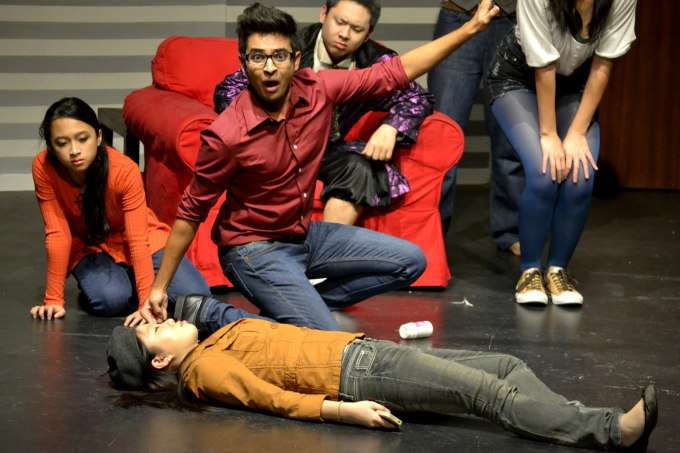
Shrey performing in the Raffles Players’ staging of the play The Bold, The Young, The Murdered.
Personal Healing
The ability to evaluate ourselves and figure out what it is that is inhibiting us from achieving our goals, allows us to take the step towards healing, towards weathering the difficult situations that are inevitable in life and in doing so, turn our lives around.
In 2016, I was diagnosed with clinical depression and pure obsessive compulsive disorder. I was practically bed-ridden with anxiety and doubts stemming from my own non-acceptance of some people in my life and their past actions, which, on some level, I, then, morally disagreed with. Keeping the medical side of it aside, what else really led me to genuine recovery was an honest introspection into my own prejudices and fallacies of thinking. It was only when I was clearly able to see and acknowledge this in myself, that I was able to open up to the possibility of accepting others the way they were in my life.
I could not change the past, but I could, through empathy, come to understand why these people made these decisions in their lives. It was not unlike my daily toil as an actor – as I strive to understand and embody my characters, so too do I have to truly understand others and embody the forgiveness and acceptance I would have liked to see in me had I been in their position.
In order words, I had to truly learn, deep down in my core, what was meant by the Golden Rule – ‘do unto others as you would have them do unto you’.
This experience, I am sure, is not unique to me or my profession as an actor. These lessons are universal and we all, in our respective journeys, will come across them and are forced to learn them in our own way.
The study of Philosophy, therefore, is all the more crucial.
The Importance of Feeling
I feel that my experience in the Raffles Programme from 2008 to 2013 was critical to my development as someone who could execute such deep introspection effectively. The Philosophy curriculum introduced me in Y1 to the foundations of logical thinking and the big concepts of identity, fairness, friendship and more. I was trained to think deeply about all of this and learnt to organize and form my thoughts logically around each of these topics.
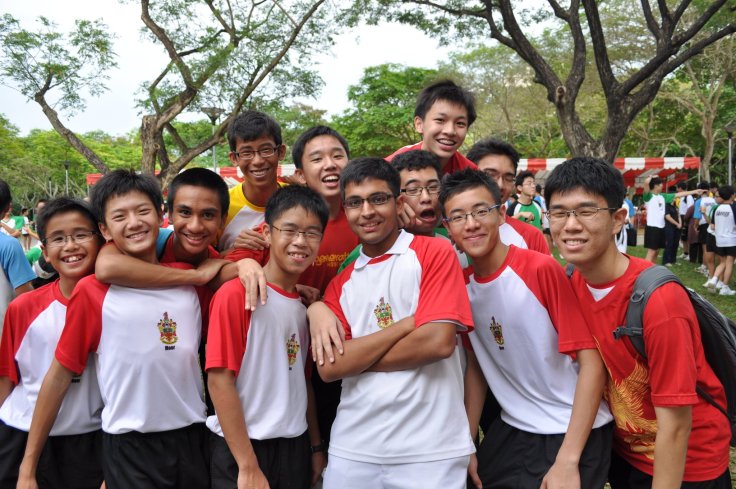
Shrey with his fellow Moor Houseat the annual RI Cross-Country.
Even if, at that point of time, I simply thought that Philosophy was this ‘airy-fairy’ subject – that I enjoyed because, hey, I didn’t have to take actual exams for it! – the fact was that those weekly classes were laying the foundations of how I think. And I am so grateful for it.
In Y2, I was introduced to ethics and how to evaluate what is right and wrong – and how there can be different approaches to the same truth. I was enthralled by how the same decision can be right from one perspective and wrong from another, and this amazement, while then simply that, was over the years transformed into a genuine curiosity into what makes us the complex beings that we are. The Philosophy programme was shaping my artist mind. I was developing the faculties of appreciating different points of view and the seeds of empathy were beginning to form in me.
This is so important to note. We often think of Philosophy as being so intrinsically tied with rational thought and logic that we forget that Philosophy ultimately pushes us to empathize. And empathy, by God, is the greatest of Human emotions. It is what defines us as more than biological robots on this planet Earth. It gives us the experiences which make our human life worth living – the joy we feel when we see someone we love succeed, the grief we experience when we see others in pain, the bursting into tears when we watch a heart-wrenching film. Every little moment – that on our deathbeds we are bound to appreciate – is defined by our ability to empathize and feel.
And while we automatically assume that to empathize and feel belongs within the territory of the arts – the fact is that while that is on the surface true, underneath, it belongs to Philosophy. The arts, all its forms, expound on the Human Condition, and they do so by critically evaluating the underlying philosophies of ways of life, of being human. Our study of philosophy positions us well to develop the faculties of empathy, if we are acutely aware enough to make sure we do not make Philosophy merely an intellectual masturbation session.
A Larger Purpose
We must remember that intellectual cracking of ethical arguments, ideas and so on will give us nothing, if we are unable to feel the human implications of them and if we are unable to then use those feelings to drive us towards a purpose larger than us – to affect a positive change in our lives and of those around us.
In Y3, I was introduced to political philosophy which covered issues surrounding distributive justice, as well as the organization of society. This introduced me to issues relevant to the political climate and social issues of today – what is the more effective political system? Democracy? Authoritarianism? Socialism? This pushed me to think critically about why different societies around the world are organized differently, and learn to empathize with each different society for their different circumstances that led them to their current political and social state.
In other words, I was finally shaped to become a global citizen. I was made to think of not just myself but of the world, and that, I believe, was the beginning of my development as an advocate-artist. Now, while studying Dramatic Arts and Cinema & Media Studies at the University of Southern California, I look to create art, whether through the roles I play, or through the films and theatre that I make to push audiences to evaluate their own humanity and think critically of social issues surrounding us. I have a higher purpose than myself in my existence on this planet. I am not caught simply in the rat race of the survival of ‘me, me, me’, but rather I have stopped to consider, ‘What am I here for? What will I leave behind? How can I make this world a little better than when I first came into it?’
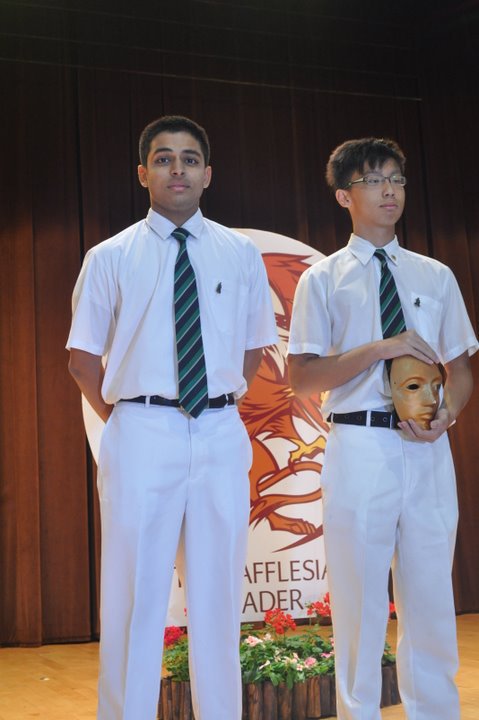
Society Through a Critical Lens
This is not limited to my craft of course. As a person, I am driven to call out fallacious ways of operating in our society that have been the norm for far too long and that which only discriminate against communities that are already on the periphery. I aim to be the one that stands up for what is right, no matter how unpopular it may be, because ultimately, our world needs people like that.
Take for instance, the recent May 2017 saga surrounding the Ah Boys to Men 4 audition that I attended and the resulting nationwide discussion on ‘casual racism’.
For those not acquainted with the events, in a nutshell, at the audition I was asked to ‘be more Indian’. I made a Facebook post about it because in my opinion that statement suggested that the Chinese casting director had a preconceived idea of what ‘being Indian’ meant. This idea was thus defined by a Chinese casting director and revealed the demand of the larger Singaporean audience to see ‘Indian’ characters that fit
their idea of what the Indian identity was. How could an entire identity be
defined in such a way? Can you really behave or act
Indian? My Facebook post went viral and divided the nation. Many sided with me and understood where I was coming from but many other Singaporeans thought I was over-reacting and ‘playing the race card’.
Others thought I was doing this just for fame or that I was a ‘Social Justice Warrior’ (at this point I must point out that it is an undeniable fact that there are people fighting for communities they are directly part of or involved with and must do so to make this world a better and more inclusive place for all. Calling them out as ‘SJWs’ is merely a deflection and excuse not to pay attention and this does more harm than good).
Huge online debates ensued, celebrities and an infamous blogger got involved. The nation became polarized with many sending me comforting and encouraging messages of support and many others, in essence, asking me to ‘flip a Prata and go back to India‘ (yes that was a real comment I received).
What started as a personal reflection on an event that had happened to me ended up becoming a nationwide argument. And at first, yes, it seemed like an argument blown out of proportion with people from both sides chiming in with derogatory words to insult their opponents.
What I want to point out though is what took place in the weeks and even months to follow. As the situation died down, I heard that schools had picked up the example to talk about in their morning civic classes. Casual Racism was now a topic being academically discussed. My example was being used to highlight how racism doesn’t necessarily have to be overt and this was now being introduced into the consciousness of our young students. Further articles evaluating the issue were published in the newspapers drawing attention to the issue of minority representation in the media and the issues of casual racism. This was great. When I heard all this from friends and family (my sister actually had to go through the embarrassing ordeal of revealing to her civics tutor in class that the Indian actor he/she was talking about was her brother), I was pleased because I knew that I had stood up for what I thought was right and people were beginning to critically think about it and acknowledge it.
Critically thinking about a social issue is so important in discerning what really is problematic with society. If one did not understand the underlying nuances behind why asking someone to ‘be more Indian’ may come across as offensive then it is only natural for them to think that I was over-reacting. So it is important that I did speak out and that society was moved by it enough to evaluate itself. If it were not for Philosophy, I am sure I would be unable to formulate why I felt offended in the first place. I may have just thought it was because they asked me to be stereotypical or that I had to do the accent. I would not have realized that it was the casting director’s assumption that there was an ‘Indian’ way of being (which was supposedly funny) that was bothering me.
The study of Philosophy trains us to identify assumptions, biases and lapses in logic. It pushes us to critically evaluate these assumptions and reach conclusions that are logical and well thought out. It trains us to argue with respect, understanding and empathy. In Philosophy class, I remember that one of the earliest things we learnt was how to form an argument – premise one, premise two, premise three, conclusion. We were taught how to organize our thoughts and clearly articulate them in a way such that our ideas logically flowed from one to the next. As we engaged in in class discussions, we were reminded to talk with respect and to honor our fellow classmates’ opinions. We were trained not to jump to derogatory remarks even if we deeply disagreed with someone’s view point.
These are incredibly important skills to have to develop a society that maturely engages with social issues, and so I deeply believe that Philosophy should be included as a mandatory part of all curricula in all schools – even if as an enrichment course without examinations.
Thinking in a Trumpian Era
René Descartes famously said ‘I think, therefore I am’. This cannot be truer. Who we are, what we believe in, how we behave and the resulting issues we face collectively as a society all boils down to how we think. How we think can be shaped by the study of Philosophy, and in an age where Donald Trump is the President of one of the most powerful countries in the world, I know we could all do with more of that.
Take the problem of ‘fake news’. Our government recently urged us to be careful of sites that offer outright fake news stories. How do we discern if a news article is fake or real? The answer is that we do that by critically evaluating our news sources – the media publications’ biases and assumptions. It is only with a critical mind that we can protect ourselves from the onslaught of untrue information. Philosophy is more important now than ever before.
As Singaporeans, we cannot be complacent. We must thus evaluate our education system and consider why the inclusion of Philosophy and other arts will only do us all good. Even if we look at this issue purely economically – that is to say, in the sense that our academic qualifications ought to get us jobs – the fact is that the world is no longer merely relying on people with STEM qualifications.
Cathy N. Davidson, the founding director of the Futures Initiative and a professor at the doctoral program in English at the Graduate Center of the City University of New York, the author of the book “The New Education: How to Revolutionize the University to Prepare Students for a World in Flux” and an appointee by former American President Barack Obama to the National Council on the Humanities, highlights, in a Washington Post article the significance of Google’s Project Oxygen and Project Aristotle (Hmm I wonder why a Philosopher’s name!).
These were two studies done to gather data about the skills of Google’s employees. The former concluded that the “seven top characteristics of success at Google are all soft skills:
being a good coach; communicating and listening well; possessing insights into others (including others different values and points of view); having empathy toward and being supportive of one’s colleagues; being a good critical thinker and problem solver; and being able to make connections across complex ideas” (Davidson and Strauss). The latter showed that the “best teams at Google [also] exhibit a range of soft skills:
equality, generosity, curiosity toward the ideas of your teammates, empathy, and emotional intelligence” (Davidson and Strauss). I have bolded the skills that are directly developed by the study of Philosophy, which I have explained in this article.
Let that sink in. Google, one of the biggest tech companies out there, is suggesting that skills which are nurtured by Philosophy and other Humanities subjects are the most important skills to their success.
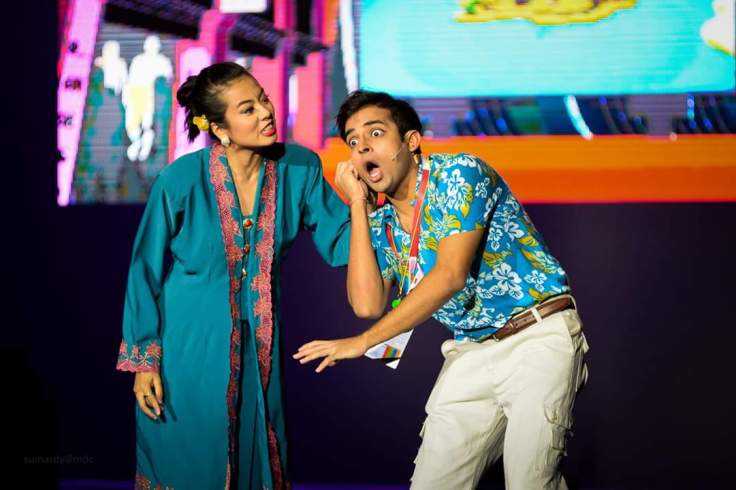
We must stop looking merely at grades and numbers to define the quality of our education. We must look ahead to whether we are able to shape individuals who can think for themselves, evaluate their own assumptions and prejudices and engage in healthy and meaningful debates with others that push them to a better state of being. We must strive to create an environment that nurtures empathy in our youth. We must give Philosophy and the Humanities their due importance.
As Rafflesians, we must feel grateful for having Philosophy in our curriculum. We must cherish the opportunity for growth we are receiving every week, and do our best to learn and flourish from it. At the same time, we must recognize this privilege and not berate others from other backgrounds who may not have the opportunity to study Philosophy. Humility is another key ingredient in making a respectable and influential individual. Philosophy teaches us that. Why? Because it humbles us to ask questions, not simply answer them. To know that there is much you do not know, is the greatest wisdom of all. And I cannot take credit for that last sentence, for Socrates said, “the only true wisdom is in knowing you know nothing”.
It is not without reason that Philosophy is central to the Rafflesian identity. Without critical thought and empathy, there is no way that one can become a thinker, leader or pioneer. There is no way that we could hope for a better age if we are unable to look at ourselves and call out our own prejudices, assumptions and fallacies, and have the humility to change.
We must embrace Philosophy and let it overwhelm us – let it engage our creative faculties, arouse our curiosity, and push us to ask the ultimate questions.
We must let it affect us from deep within.
And then we must make a change.
And while whether we choose to change is ultimately up to us, the study of philosophy may give us the ability to choose in the first place, because we will be awakened to the need to change itself.
I cannot stress more how the study of Philosophy in my formative years in Raffles has shaped the way I think and approach life.
While at college, I have been inspired to dive deeper into the philosophies of Marcus Aurelius, Kierkegaard, St Augustine, Nietzsche and more and to use and apply my learnings of, for example, stoicism, in my own life and other ideas in my art to inspire others as well.
In short, I have learned to live and to live well, and I hope that you, reading this, will choose to embark on the journey of self-discovery by pondering on questions central to Philosophy.
As for the kids (Yes, you Rafflesians, you are kids. And yes, to the teachers, I know I am a kid in your eyes still), don’t dismiss Philosophy with
‘What can I do with it?’
You know what you can do?
Make your life a life full of everlasting growth, inspiration and abundance. Take it!
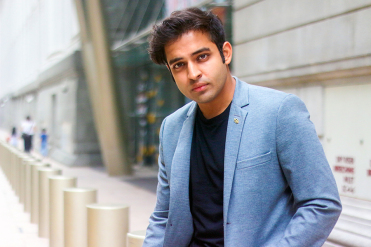 Shrey Bhargava (RI’13) is an actor, host and filmmaker from Singapore. He is best known for playing Brando in Mediacorp Channel 5’s comedy series, Fine Tune (2016) and finishing Runner Up in Mediacorp’s competition, The 5 Search (2015). He is currently pursuing a Bachelor of Fine Arts (BFA) in Acting at the University of Southern California, in Los Angeles. He has formally trained in Acting at Buds Youth Theatre, SRT’s Young Company, Acting and Hosting at the SAF Music & Drama Company, in Lee Strasberg’s Method and Acting for Camera at Haque Centre of Acting & Creativity and in Improvisation at The Improv Company.
Shrey Bhargava (RI’13) is an actor, host and filmmaker from Singapore. He is best known for playing Brando in Mediacorp Channel 5’s comedy series, Fine Tune (2016) and finishing Runner Up in Mediacorp’s competition, The 5 Search (2015). He is currently pursuing a Bachelor of Fine Arts (BFA) in Acting at the University of Southern California, in Los Angeles. He has formally trained in Acting at Buds Youth Theatre, SRT’s Young Company, Acting and Hosting at the SAF Music & Drama Company, in Lee Strasberg’s Method and Acting for Camera at Haque Centre of Acting & Creativity and in Improvisation at The Improv Company.
As one of the pioneer batches of Raffles Programme students who went through the school’s Philosophy programme, Shrey shares about how the programme has touched or informed his life decisions since then.